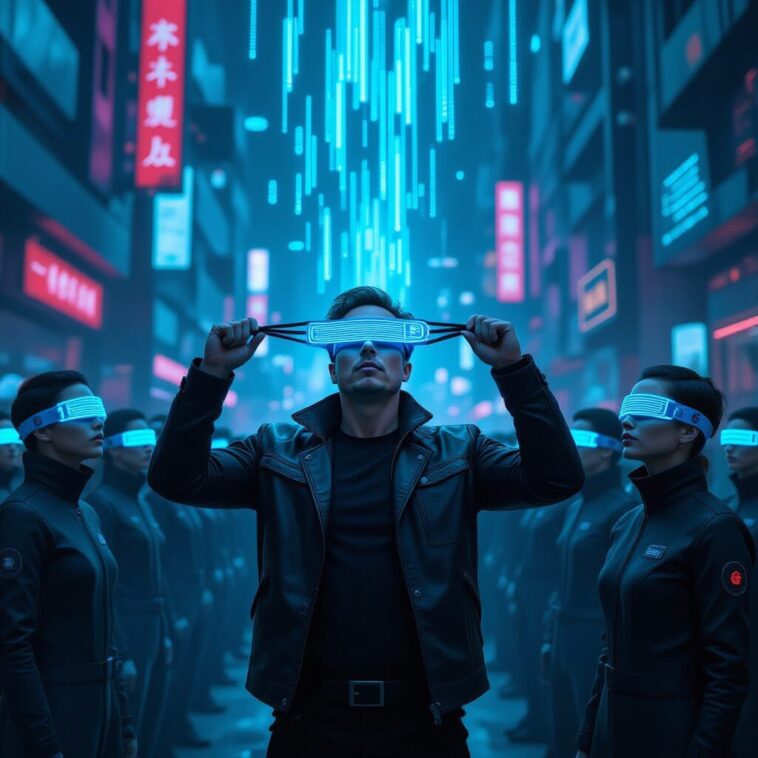In the year 2025, it has become perfectly normal for a single individual to own a global social media platform, manipulate its algorithms to promote his personal business interests, and then publicly complain when other corporations refuse to participate in his marketing scheme. This is not corruption. This is innovation, apparently!
The individual in question, of course, is the owner of X (formerly Twitter) – Elon Musk, who has recently discovered that Apple—despite his artificial intelligence chatbot Grok receiving one million reviews with a 4.9 average rating—refuses to include it in their recommended AI chatbots. This omission, he suggests, represents a grave injustice that strikes at the very heart of free market competition.
What makes this particularly fascinating is not the complaint itself, but the exquisite blindness it reveals to the mechanisms of his own influence machine.
The Algorithm Knows Best
On X, the algorithm has developed what we might call “omnipresent consciousness.” Whether you follow the platform’s owner or not, whether you have expressed interest in electric vehicles, space exploration, or artificial intelligence, the algorithm ensures you will see his content. This is not manipulation—this is optimization for user engagement.
The same algorithmic wisdom that surfaces his thoughts on Mars colonization (a project that appears to have taken a backseat to AI development) also ensures that when users search for AI assistance, Grok appears prominently while competitors like Perplexity—which had been quietly serving users with their Ask Perplexity bot long before Grok’s arrival—fade into algorithmic obscurity.
Perplexity, notably, has not filed complaints about this treatment. They have maintained what used to be called “professional dignity,” though this concept has become somewhat antiquated in the current business environment.
The Numbers Game
One million reviews. 4.9 average rating. These numbers, we are told, represent authentic user satisfaction. The fact that these reviews appear on a platform owned by the same individual who created Grok is merely coincidence. The fact that Grok is promoted through the same algorithmic systems that ensure his other business ventures—SpaceX and Tesla—receive maximum visibility is simply efficient resource allocation.
When asked about potential conflicts of interest, Grok itself has demonstrated remarkable honesty, acknowledging that its creator has indeed manipulated X to favor his own views, businesses, and products. This represents a new form of corporate transparency: the product admitting to its own preferential treatment while continuing to benefit from it.
The Apple Resistance
Apple’s refusal to recommend Grok alongside other AI services has been interpreted as anti-competitive behavior. The logic is straightforward: if you control a major social media platform, manipulate its algorithms to promote your AI product, generate favorable reviews through your captive audience, and then complain when independent companies won’t validate your success metrics, you are clearly the victim of corporate discrimination.
Apple, for their part, has remained silent on the matter. Their App Store guidelines, which typically require clear separation between platform ownership and product promotion, seem to have met their match in the new era of vertical integration.
The Macrohard Gambit
Perhaps sensing that his influence over X alone might not be sufficient to reshape the entire technology landscape, our protagonist has recently announced “Macrohard”—a venture positioned as the antithesis to Microsoft. The name itself represents a masterclass in market positioning: take your competitor’s name, make it sound more aggressive, and hope the semantic difference translates into business success.
Early employee surveys from Macrohard suggest the working environment emphasizes “disruption” and “hardcore” work ethics, concepts that have proven highly effective in other ventures. The fact that this represents yet another business venture requiring promotional support through X’s algorithmic systems is purely coincidental.
The Mars Question
Critics have noted that the intense focus on artificial intelligence appears to have diverted attention from Mars colonization efforts, previously described as humanity’s most urgent priority. This observation misunderstands the strategic thinking involved. By creating an AI system that requires constant promotional support, platform manipulation, and public advocacy battles, valuable lessons are being learned about resource allocation that will surely prove useful when establishing self-sustaining colonies on Mars.
The red planet, after all, will need its own communication systems, and who better to control them than someone who has already perfected the art of algorithmic influence on Earth?
The New Normal
In our current environment, it has become acceptable—even admirable—for platform owners to use their systems for personal business promotion. The traditional concept of “conflict of interest” has evolved into “synergistic business optimization.” When other companies fail to participate in this optimization, they reveal themselves as obstacles to innovation.
The beauty of this system lies in its transparency. Everyone can see exactly what is happening. The algorithms are not hidden; they simply work in mysterious ways that happen to benefit their creator’s various business interests. The reviews are not fake; they simply reflect the authentic enthusiasm of users who encounter Grok through perfectly natural promotional channels.
The Ministry of Truth Tweets
Every day, millions of X users receive information about electric vehicles, space exploration, and artificial intelligence through channels they did not explicitly choose to follow. This information comes to them because the algorithm has determined it serves their interests, even when they were searching for cat videos or restaurant recommendations.
This represents the democratization of important information. In the old system, users had to actively seek out news about Mars colonies or AI development. In the new system, the algorithm ensures they receive this education automatically.
The fact that this educational content coincidentally promotes the business interests of the platform owner simply demonstrates the alignment between public good and private enterprise that makes capitalism so efficient.
What do you think about this new model of platform ownership and product promotion? Should companies like Apple be required to promote products that achieve success through algorithmic manipulation? And seriously—Macrohard? Are we just not talking about how that’s the most try-hard company name since… ever?





GIPHY App Key not set. Please check settings